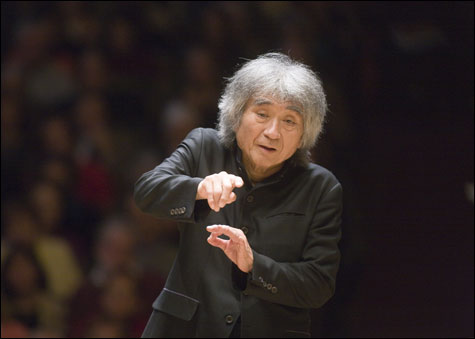
When Ozawa asked the orchestra to bow, the players remained seated in order to join the applause. |
Seiji Ozawa, the Boston Symphony Orchestra's Music Director Laureate, was back at Symphony Hall leading the BSO for the first time since leaving Boston in 2002 for the Vienna State Opera. At a last-minute press conference in a Symphony Hall corridor, he spoke of the "strange feeling of coming back home" and talked a little music ("In Vienna, I wanted to do opera — now I know all the tricks of the opera house from the inside") and a lot of sports ("All good things happened after I left Boston"). The press was invited to a rehearsal of one of his Boston specialties, Berlioz's youthfully autobiographical Symphonie fantastique ("episode from the life of an artist," Opus 14). Asked whether he had any new thoughts about this piece, Ozawa answered, "I don't know — I think maybe a little. I'm getting older." (He's now a pretty youthful 73.) Shoeless after some foot surgery, he led the rehearsal in flaming red socks.
In celebration of Olivier Messiaen's 100th birthday (born one day before Elliott Carter, he died in 1992), Ozawa opened the concert with another specialty, Messiaen's 1944 Trois petites liturgies de la Prûsence Divine (a piece he led in 1978, its only previous BSO performance — which was a high point of the BSO centennial 12-CD box). This magical new performance had pianist Peter Serkin supplying the twittering bird songs and Takashi Harada on the creepy, otherworldly ondes Martenot (the electric instrument Messiaen loved), with cymbals, vibraphone, maracas, and celesta contributing to the uncanny sound world. Messiaen's own devotional texts were sung by the women of the Tanglewood Festival Chorus, their central, oft-repeated high arching phrase soaring magnificently (though enunciation was frustratingly blurry).
According to the BSO, between April 1991 and July 2002 no one but Ozawa led the BSO in the Berlioz. For the first few minutes of the opening "Reverie," the remarkable sensitivity and urgency, and sense of character, suggested that maybe Ozawa had learned something from conducting so much opera. But halfway through the movement, he lost focus, and it stayed lost through a square, insipid "Ball" scene (the ravishing waltz completely lacking in sweep or lilt) and an uneventful "Scene in the Country," the latter beautifully played (some 20 new musicians have come to the BSO since Ozawa left) but devoid of atmosphere. The "March to the Scaffold" (Berlioz's hero dreams he's murdered his beloved) was livelier, but oddly more celebratory than menacing. The final spine-tingling "Dream of a Witches' Sabbath," sounding appropriately coarse and nasty (an obnoxious cell phone wasn't out of place in these fiendish goings-on), brought down the house. Ozawa, obviously touched, applauded back. And when he asked the orchestra to bow, the players — some of whom had widely reported reservations about Ozawa during his 29-year Boston tenure — remained seated in order to join the applause.
In 2001, the Boston Early Music Festival joined the Celebrity Series in bringing William Christie's Les Arts Florissants in a dazzling double bill of late-17th-century chamber operas: Marc-Antoine Charpentier's Actûon followed by Henry Purcell's masterpiece, Dido and Aeneas. Now BEMF has produced its own English/French pairing, preceding the more dramatically sophisticated Actûon with Purcell's teacher John Blow's Venus and Adonis, perhaps the very first real English opera, to which Dido is clearly indebted (though except in a few inspired passages, it's a work of greater historical than musical interest).